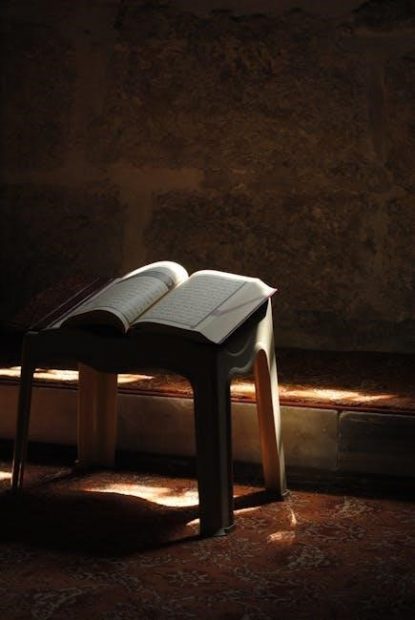The first para of the Quran, known as Juz 1, begins with Surah Al-Fatihah and part of Surah Al-Baqarah․ It holds deep spiritual significance, guiding believers in worship and daily life․ This section is often recited in prayers and is a foundational part of Islamic scripture․ Its teachings emphasize gratitude, guidance, and the oneness of Allah, making it a cornerstone for spiritual growth and enlightenment․
1․1․ Overview of the First Para (Juz)
The first para, or Juz, of the Quran encompasses Surah Al-Fatihah and the initial verses of Surah Al-Baqarah․ It serves as a foundational section, recited daily in prayers, offering guidance on worship and life․ This Juz is highly revered for its profound teachings, emphasizing Allah’s oneness and humanity’s purpose․ Its verses are a cornerstone for spiritual reflection and practice, making it essential for believers seeking enlightenment and connection with the divine;
1․2․ Significance of the First Para in Islamic Tradition
The first para holds immense significance as it introduces foundational Islamic teachings․ Surah Al-Fatihah, known as the “Mother of the Quran,” is recited in every prayer, reflecting its centrality in worship․ This section emphasizes the oneness of Allah and humanity’s purpose, serving as a spiritual cornerstone․ Its verses are deeply revered, offering guidance, comfort, and a connection to the divine, making it indispensable in daily life and rituals․
Structure and Content of the First Para
The first para comprises Surah Al-Fatihah and the beginning of Surah Al-Baqarah․ Surah Al-Fatihah, with seven verses, is a prayer for guidance, while Surah Al-Baqarah introduces key Islamic principles․
2․1․ Surah Al-Fatihah: The Opening Chapter
Surah Al-Fatihah is the first chapter of the Quran, consisting of seven verses․ It is a prayer for guidance, known as “The Opening,” and is central to Islamic worship․ Recited in every prayer, it emphasizes praise, mercy, and seeking the right path․ Its verses highlight Allah’s sovereignty and humanity’s need for divine guidance, making it a foundational part of the Quran and a cornerstone of spiritual life․
2․2; Surah Al-Baqarah: The Cow
Surah Al-Baqarah is the second and longest chapter in the Quran, containing 286 verses․ It is part of the first para and holds significant religious importance․ The surah includes essential teachings on faith, worship, and the oneness of Allah․ It also recounts stories like the creation of Adam, the story of the cow, and the command to establish prayer, emphasizing guidance and divine wisdom for believers․
2․3․ Key Verses and Their Meanings
Key verses in the first para include the opening of Surah Al-Baqarah, emphasizing the Quran’s guidance and divine origin․ Verses like “Alhamdu lillahi Rabbil ‘Aalamien” from Surah Al-Fatihah highlight praise and worship, while others focus on righteousness and seeking Allah’s path․ These verses provide spiritual and moral guidance, defining the framework for a faithful life and connecting believers to Allah’s will․ They are essential for understanding Islamic values․

Benefits of Reciting the First Para
Reciting the first para fosters spiritual growth, emotional calmness, and strengthens faith․ It deepens understanding, enhances mental clarity, and brings believers closer to Allah’s divine guidance and peace․
3․1․ Spiritual Growth and Enlightenment
Reciting the first para enhances spiritual growth by connecting believers to Allah’s divine message․ It illuminates the heart, fostering enlightenment and a deeper understanding of Islamic teachings․ Regular recitation strengthens faith, providing guidance and comfort, and helps in developing a closer relationship with the Holy Quran, leading to inner peace and spiritual fulfillment․
3․2․ Emotional and Mental Calmness
Reciting the first para brings emotional and mental calmness, alleviating stress and anxiety․ The divine words provide solace, comforting the soul and fostering inner peace․ Regular recitation helps believers navigate life’s challenges with tranquility, creating a sense of security and balance in their emotional well-being․
3․3․ Strengthening Faith and Connection to Allah
Reciting the first para reinforces faith, deepening one’s bond with Allah․ Its verses inspire devotion, guiding believers to seek divine mercy and wisdom․ This practice strengthens spiritual resilience, fostering a profound sense of connection and reliance on Allah, essential for navigating life’s challenges with unwavering faith and trust in His guidance․
How to Download the First Para of the Quran in PDF
Visit trusted websites like www․Islamicnet․com or AlKalam․PK․ Search for “Quran Para 1 PDF,” select the desired file, and download it for free․ Ensure the source is reliable for accurate content․
4․1․ Reliable Websites for Quran PDF Downloads
Trusted platforms like www․Islamicnet․com and AlKalam․PK offer authentic Quran PDFs․ These websites provide free downloads of the first para, ensuring high-quality and accurate content․ Users can easily search for “Quran Para 1 PDF” and download it instantly․ Additionally, Internet Archive hosts various Quran PDFs, including the first para, for convenient access․ Always verify the source for authenticity and accuracy․
4․2․ Step-by-Step Guide to Downloading
Visit a trusted website like www․Islamicnet․com or AlKalam․PK․ Search for “Quran Para 1 PDF” in the search bar․ Select the desired file from the results․ Click the download button or link provided․ Choose a location to save the PDF on your device․ Ensure the file is from a verified source for authenticity․ Open and review the document after completion․ This process is quick and user-friendly for all․
4․3․ Free Resources and Platforms
Access the first para of the Quran in PDF from trusted platforms like www․Islamicnet․com and AlKalam․PK․ These websites offer free downloads without registration․ Additionally, Deeniyat․Com provides a free 11-line Quran PDF․ The Internet Archive also hosts free Quran Para 1-30 PDFs for easy access․ Ensure to verify the authenticity of the source before downloading to maintain the integrity of the text and its teachings․
Understanding the First Para
The first para of the Quran includes Surah Al-Fatihah and part of Surah Al-Baqarah, providing foundational teachings on worship, divine guidance, and the oneness of Allah․
5․1․ Historical Context and Revelation
The first para of the Quran, Juz 1, was revealed in Makkah during the early years of Prophet Muhammad’s (PBUH) mission․ Surah Al-Fatihah is considered the “Mother of the Quran,” revealed as a comprehensive guide for worship and daily life․ Surah Al-Baqarah, the longest chapter, was revealed later in Madinah, addressing communal and societal issues․ These revelations laid the spiritual and legislative foundations of Islam, guiding believers in faith, practice, and ethical conduct․ The historical context underscores the divine wisdom in addressing both individual and collective needs, shaping the Islamic community’s identity and purpose․ The revelation of these chapters marked a pivotal moment in Islamic history, providing timeless guidance that continues to inspire and direct Muslims globally․ Understanding this historical backdrop enriches the comprehension of the Quran’s message and its application in modern life․
5․2․ Linguistic and Literary Analysis
The first para of the Quran showcases exceptional linguistic and literary excellence․ Surah Al-Fatihah, with its rhythmic cadence and profound metaphors, exemplifies the Quran’s inimitable style․ The use of oath-taking in Surah Al-Baqarah, such as “By the daybreak” (92:1), demonstrates masterful literary devices․ The text employs parallelism and contrasts, enhancing its emotional and intellectual impact․ These elements underscore the Quran’s unique linguistic beauty and its status as a literary miracle in Islamic tradition․
5․3․ Thematic and Theological Insights
The first para of the Quran offers profound theological insights, emphasizing divine mercy, guidance, and human accountability․ Central themes include the oneness of Allah (Tawhid) and the purpose of creation․ It also highlights the distinction between believers and disbelievers, urging righteousness and worship․ These themes form the theological foundation of Islam, providing a roadmap for spiritual and moral development, and reinforcing the Quran’s role as a guide for humanity․

Recitation and Tajweed Guidelines
Proper Tajweed ensures accurate Quranic recitation, preserving the divine message․ Focus on correct pronunciation, rhythm, and melodious delivery․ Seek guidance from qualified teachers for optimal learning and practice․
6․1․ Proper Recitation Techniques
Mastering proper recitation techniques involves understanding articulation points, vowel lengths, and stress patterns․ Practice correct mouth and tongue placements to articulate letters clearly․ Pay attention to pauses, stops, and transitions between verses․ Regular practice with experienced tutors enhances fluency and accuracy, ensuring the Quran is recited as revealed, preserving its beauty and divine message effectively for all believers seeking spiritual growth and enlightenment․
6․2․ Importance of Tajweed in Recitation
Tajweed is essential for the proper recitation of the Quran, ensuring the correct pronunciation of Arabic letters and words․ It preserves the divine message’s authenticity and beauty, maintaining the integrity of revelation․ Applying Tajweed rules enhances the spiritual experience, allowing reciters to connect deeply with Allah’s words․ Its observance is a sign of respect and dedication to the holy text, fostering a meaningful and engaging recitation practice․
6․3․ Common Mistakes to Avoid
Common mistakes in reciting the first para include ignoring Tajweed rules, such as incorrect pronunciation of letters like “ق” and “ت․” Many reciters also misapply rules of “Waqaaf” (pauses) and “Wasl” (connections)․ Overlooking these details can alter the meaning and beauty of the Quranic text․ Practicing with a qualified teacher and regular review are essential to avoid such errors and maintain the sanctity of the recitation․

Learning Aids and Resources
Explore online platforms, mobile apps, and PDF guides for learning the first para․ Utilize recommended books and courses to enhance your understanding and recitation skills effectively․
7․1․ Online Courses and Tutorials
Enroll in online courses and tutorials to master the first para of the Quran․ Platforms like Islamicnet․com offer structured lessons with Tajweed, making learning accessible and engaging․ These resources provide video tutorials, interactive sessions, and downloadable materials to enhance your understanding and recitation skills․ Many courses are designed for beginners, ensuring a smooth and guided learning experience tailored to your pace and needs․
7․2․ Mobile Apps for Quran Learning
Utilize mobile apps like Quran Majeed or iQuran to learn the first para of the Quran․ These apps offer features such as downloadable PDFs, Tajweed lessons, and audio recitations․ They provide interactive tools to track progress and enhance memorization․ Apps like IslamicNET also offer courses with Tajweed, making it easier to learn and recite the Quran accurately․ These resources are ideal for learners seeking convenience and flexibility in their studies․
7․3․ Recommended Books and Commentaries
Enhance your understanding with books like Tafsir Ibn Kathir and Tajweed Rules of the Quran․ These resources provide deep insights into the first para’s meanings and proper recitation․ Websites like Deeniyat․Com and IslamicNet․com offer downloadable PDFs of these commentaries, making it easy to study the Quran’s teachings․ These materials are essential for learners seeking a comprehensive understanding of the first para․

Cultural and Historical Significance
The first para of the Quran holds profound cultural and historical importance, serving as a foundation for Islamic traditions and rituals․ Its verses have shaped Islamic identity and continue to inspire generations, preserving the divine message and fostering a deep connection to the faith’s heritage․
8․1․ The First Para in Islamic Culture
The first para of the Quran is deeply ingrained in Islamic culture, often recited in daily prayers and ceremonies․ It symbolizes the divine connection and serves as a source of guidance, fostering unity among Muslims worldwide․ Its verses are frequently memorized and reflected upon, making it a cornerstone of Islamic identity and cultural heritage, passed down through generations with profound reverence and respect․
8․2․ Historical Preservation and Transmission
The first para of the Quran has been meticulously preserved since its revelation, with early companions memorizing and recording it․ The caliph Uthman standardized the text, ensuring its authenticity․ This para, like the entire Quran, was transmitted orally and in written form, maintaining its integrity․ Its historical preservation underscores its divine origins, making it a reliable source for spiritual guidance and study, even in modern PDF formats today․
8․3․ Role in Islamic Rituals and Practices
The first para is integral to Islamic worship, recited in daily prayers and special congregations․ Its verses, particularly from Surah Al-Fatihah, are essential in Salah, guiding believers in seeking divine guidance․ This para is also recited in Friday prayers and other significant rituals, reinforcing its central role in Islamic spiritual practices and fostering a deeper connection with Allah in communal and individual worship settings․
Tips for Effective Recitation
Focus on proper Tajweed, practice daily, and seek guidance from scholars․ Reflect on meanings to enhance spiritual connection and maintain consistency in your recitation routine․
9․1․ Creating a Regular Recitation Schedule
Establishing a consistent routine is crucial for effective recitation․ Set specific times daily, such as after Fajr or before bed, to recite the first para․ Begin with short sessions and gradually increase duration․ Use a planner or app to track progress․ Incorporate reflection on verses to deepen understanding and connection․ Consistency fosters spiritual growth and strengthens your relationship with the Quran․
9․2․ Understanding and Reflecting on the Verses
Understanding the verses of the first para is vital for spiritual growth․ Reflecting on their meanings deepens your connection with Allah and enhances personal growth․ Verses like those in Surah Al-Fatihah guide believers in worship and seeking divine guidance․ Regular reflection fosters a sense of calmness and spirituality, helping you apply the teachings in daily life․ Pause after each verse to ponder its relevance and wisdom․
9․3․ Benefits of Group Recitation
Group recitation of the first para strengthens communal bonds and enhances spiritual unity․ It fosters a collective sense of devotion and understanding, creating a powerful atmosphere of worship․ Reciting together encourages consistency, correct tajweed, and mutual encouragement․ Group settings often inspire deeper focus and emotional connection to the verses, while also providing opportunities to learn from others and grow spiritually together․
The first para of the Quran holds profound significance, offering guidance and spiritual enrichment․ Regular recitation fosters a deeper connection to Allah, promoting peace and enlightenment in daily life․
10․1․ Summary of Key Points
The first para of the Quran, comprising Surah Al-Fatihah and part of Surah Al-Baqarah, is a foundational section of Islamic scripture․ It emphasizes worship, guidance, and Allah’s oneness․ Reciting this para fosters spiritual growth, mental calmness, and a stronger connection to Allah․ Available as a free PDF, it provides easy access for learning and reflection, making it a vital resource for believers seeking enlightenment and deeper faith․
10․2․ Encouragement for Regular Recitation
Regular recitation of the first para of the Quran fosters spiritual growth, mental calmness, and a deeper connection to Allah․ Its availability in PDF format makes it easily accessible for daily practice․ Embrace this opportunity to strengthen your faith and find peace in its timeless wisdom․ Make it a habit to recite and reflect, allowing its teachings to guide you toward a more enlightened and purposeful life․
